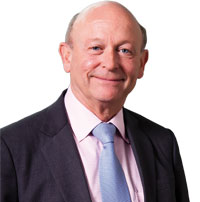Hot topic: Care.data
Post date: 04/06/2014 | Time to read article: 3 minsThe information within this article was correct at the time of publishing. Last updated 18/05/2020

The care.data programme has been subject to intense media coverage and scrutiny.GMC Chairman Professor Sir Peter Rubin looks at what doctors can disclose and in what circumstances.
Trust is a fundamental part of the doctor–patient relationship. Patients share personal details with doctors and give us an insight into their lives. They believe, and rightly so, that within clear boundaries, what is discussed and noted within the four walls of the surgery or consulting room remains private.
But, in an era where we are increasingly using technology to store and share information and to connect with patients through telemedicine and smartphone apps, issues around confidentiality have been put firmly under the microscope.
If patients don’t feel informed or reassured about what happens to the information they are giving their doctors, then they may be reluctant to seek medical attention or to provide the information necessary in order for doctors to provide good care.
On the other hand, doctors know as well as anyone that there are huge benefits for patients in making best use of new technology; it is surprising that the NHS has been slow to innovate, but with resources now at a premium we have to respond.
I firmly believe that as a profession we need to be making more use of apps, email, text and videoconferencing, and promoting the benefits of doing so – in a secure way of course – to patients.
"GMC guidance on this is clear: generally, patients should be asked for their consent before confidential information about them is disclosed"
So far as data is concerned, the NHS is uniquely placed to bring together population level, anonymised data about healthcare quality and outcomes. Doctors have responsibilities to improve the health of the public, as well as to treat the patient in front of them. This is not always an easy circle to square.
So, exactly what information can doctors legitimately disclose and under what circumstances?
GMC guidance on this is clear: generally, patients should be asked for their consent before confidential information about them is disclosed. There are times, however, when this will not apply.
If there is a legal obligation for doctors to pass on information then they must do so. The transfer of information in the care. data programme is a legal requirement and, unless a patient opts out, their information will be shared.
However, the law also says that this must be done fairly and doctors have an important role in supporting patients to make informed decisions about their healthcare, including the use of their confidential information.
The GMC expects doctors to provide information on the programme and what it means and also give information to patients on how they can opt out.
Doctors can also disclose confidential information about patients if they consider disclosure to be in the public interest. This may be justified to protect individuals or society from harm such as serious crime or communicable diseases. Information can be disclosed without consent (and in exceptional cases where consent has been withheld) if it is in the public interest to do so.
There is no denying that this is tricky and it is up to us as doctors to make a judgment and weigh up the harm that is likely to arise from not disclosing the information against the possible harm to the patient. Doctors also need to consider the implications of their actions for the overall relationship of trust between doctors and patients.
In the unfortunate event of a medical emergency, the GMC would also expect doctors to pass on information relevant to the patient’s care and, when they are able, to tell the patient what they have done.
Confidentiality is an area of practice which presents many challenges and is central to the relationship we have with our patients. We want to provide the best care to patients and we can only do so if they are open and honest with us and us with them.


